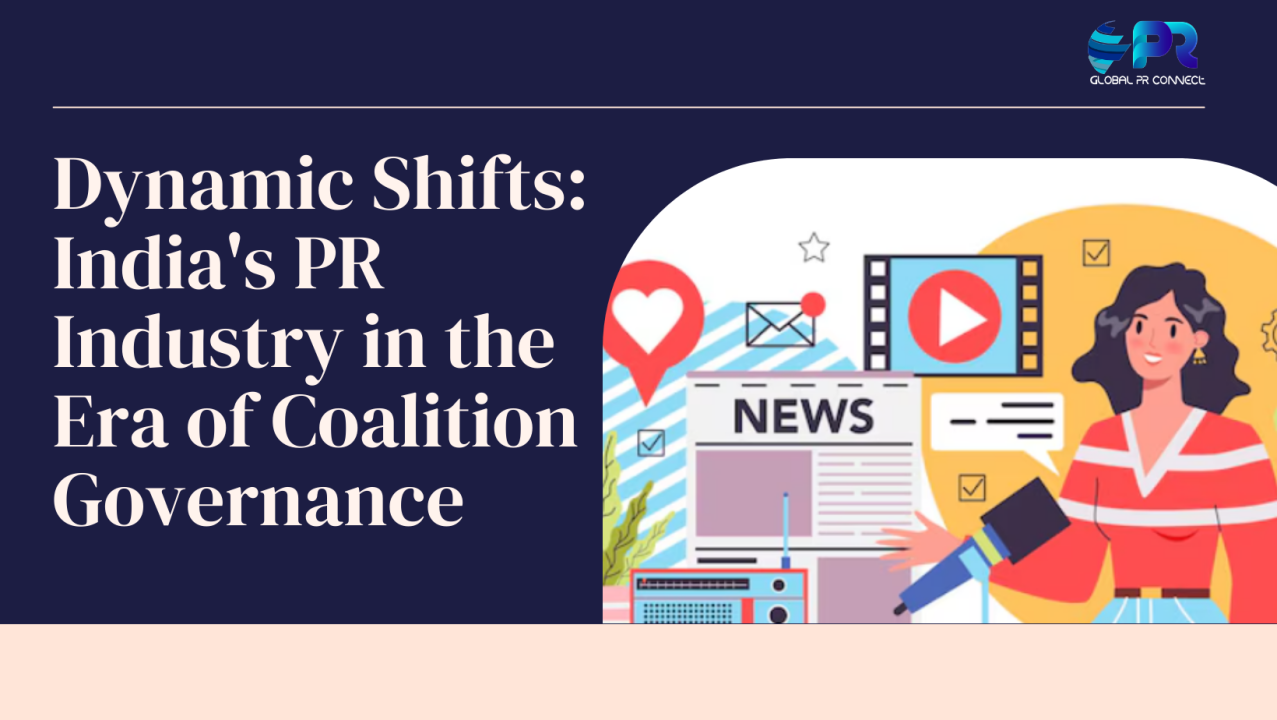India’s political landscape is set for a significant shift with the formation of a new coalition government in 2024, which will have profound implications for the public relations (PR) industry. As the country embraces a multi-party governance structure, PR professionals will play a crucial role in shaping public perception, managing communications, and influencing policy outcomes.
Understanding the Dynamics of the New Coalition
The coalition government in the centre brings together diverse ideologies and regional interests, presenting a complex scenario for PR strategists. Effective communication will be essential to bridge gaps, manage expectations, and build consensus among a variety of stakeholders. The stakes are higher when it comes to consensus building on a particular issue.
Opportunities for PR Professionals
Strategic Positioning
PR agencies can strategically position their clients amidst the evolving political landscape, ensuring alignment with the coalition’s key priorities and values, thus enhancing their reputation and influence.
Policy Advocacy
There will be an expanded opportunity to contribute policy decisions through effective PR campaigns and advocacy with multiple political parties at the helm, fostering collaboration and consensus-building across diverse stakeholder groups.
Regional Outreach
PR professionals can leverage their expertise in localized communication to connect with diverse audiences, leveraging the regional diversity of the coalition to enhance grassroots engagement and support for their clients’ development.
Challenges to Overcome
Managing Diverse Narratives
Balancing the varied narratives of coalition partners while maintaining messaging consistency will be a significant challenge, requiring sophisticated storytelling and messaging frameworks to align with the coalition’s objectives.
Crisis Management
Potential disagreements and shifts in alliances pose a risk of political volatility, necessitating robust crisis management strategies to uphold the credibility and trustworthiness of their clients.
Regulatory Compliance
With heightened political sensitivity, PR campaigns will face increased scrutiny, demanding adherence to rigorous ethical and legal standards. Proactive engagement with regulatory bodies is essential to navigate these complex landscapes effectively and maintain compliance.
Prominent Voices in the PR Industry
Prominent figures in the PR industry have weighed in on the implications of the new coalition government:
Nitin Mantri
Regional Executive Managing Director for Asia-Pacific at WE Communications and Group CEO at Avian WE, in a discussion with the PR Moment, emphasizes the importance of government stability and growth-oriented policies. He believes that whether it’s a one-party majority or a coalition, having a stable government is crucial. The recent increase in RBI’s growth projection from 7% to 7.2% reflects confidence in the economy. Mantri asserts that if the current coalition government maintains clear and consistent policies, pro-business reforms, and enhanced transparency, the positive business sentiment is likely to continue.
Aman Dhall
founder of CommsCredible, sees India Inc. exercising cautious optimism over the next 6-9 months as the new coalition government settles down. “The business sentiment will evolve,” he notes. “Startups will aggressively pursue their business plans to meet investor mandates. Meanwhile, large businesses will remain cautious, waiting to gauge the new government’s policy direction.” Dhall also highlights the contrast between the BJP leadership today and that of the 1999 NDA coalition, emphasizing the evolving political landscape.
Strategic Insights for 2024 and Beyond
As the PR industry prepares for the new coalition era, adaptability and foresight will be crucial. Embracing innovative digital strategies, harnessing data analytics, and fostering strong media relations will empower PR professionals to navigate complexities and deliver impactful campaigns. Additionally, investing in talent development to equip teams with diverse skill sets will ensure readiness to address the dynamic challenges ahead. Collaborating closely with legal and regulatory experts will be essential to ensure compliance and mitigate risks in a heightened scrutiny environment. Furthermore, maintaining a proactive approach to crisis management will safeguard reputations amidst potential political volatility. Finally, staying agile and responsive to evolving public sentiment will enable PR professionals to stay ahead of the curve and effectively shape public narratives.
Conclusion:
The new coalition government in 2024 presents significant opportunities and challenges for India’s PR industry. PR professionals will need to navigate diverse narratives, manage crises, and ensure regulatory compliance while leveraging digital strategies and strong media relations. As businesses cautiously optimize their strategies, PR agencies must remain agile and proactive to shape public perception effectively in the evolving political landscape.
 Skip to content
Skip to content 